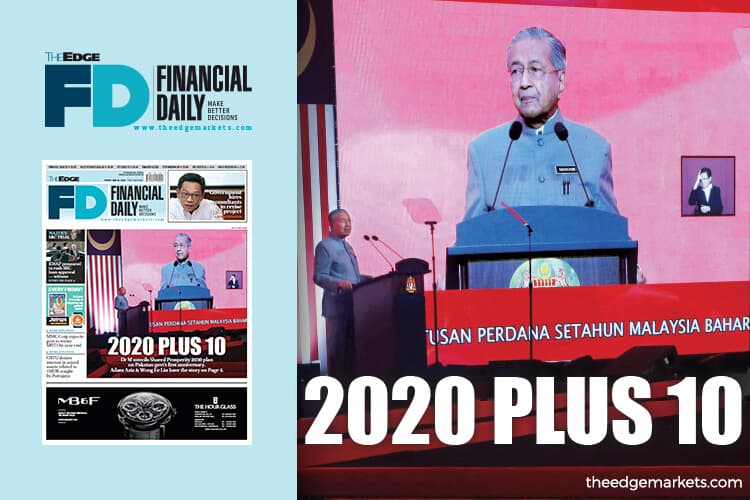
This article first appeared in The Edge Financial Daily on May 10, 2019
PUTRAJAYA: Prime Minister Tun Dr Mahathir Mohamad has introduced a new economic model which advocates shared prosperity, with a target to provide a “decent standard of living for all Malaysians” by 2030 regardless of economic class, race and geographic location.
The new economic model will replace the one that was used in the past decade, which has failed to push Malaysia towards developed nation status as underlined in Vision 2020, said Dr Mahathir in his special address yesterday in conjunction with the first anniversary of “Malaysia Baharu” — the nation’s first change in federal government since its inception.
“In the past decade, the nation’s economy has transformed radically and this resulted in us not being able to become a developed nation as underlined under Vision 2020. The economic model in the past decade only focused on adding more national debt for megaprojects,” Dr Mahathir said.
“The 70% increase in job availability comprised unskilled jobs. Much of the nation’s equity ownership turned to foreign hands. Economic growth focused on the country’s major cities, and sidelined equity ownership and growth, as well as opportunities for locals,” he added.
As such, Dr Mahathir said the government has taken the approach where “the nation’s development today provides shared prosperity to the rakyat”.
This, the prime minister said, underlined better purchasing power for the people, and the narrowing of income and wealth gaps between classes, races, territories as well as the “extreme disparity in [the] supply chain”.
“In its simple definition, the efforts towards shared prosperity will allow Malaysia to be a nation that grows continually and sustainably concurrent with fair and inclusive equitable growth across the value chain, classes, ethnicity, and geography until it results in stability and harmony among the people by 2030,” Dr Mahathir said.
The shared prosperity model comprises three main objectives, he said.
Aside from overcoming wage and wealth gaps, the economic model will also introduce a new economic model for all — to create a more structured economy that is progressive and hinges on knowledge and values with participation from Malaysians across the board.
Additionally, the shared prosperity model will hopefully turn Malaysia into an important economic axis in Asia moving forward, Dr Mahathir added.
To establish this economic approach, Dr Mahathir underlined seven key pillars:
• better structuring and improving the nation’s business and industry ecosystems such as via adoption of Industrial Revolution 4.0
• application of digital economy, and adding more high-skilled jobs
• exploring new growth sectors, and turning Malaysia from a consumer nation to one that produces more international standard products
• reforming human capital, to improve labour market and wages
• strengthening social well-being through needs-based policies
• inclusive territorial development
• improving society capital, combined with strong social support mechanisms.
Additionally, Dr Mahathir also mentioned other enablers to achieve this goal, including a progressive fiscal policy, an administration with high integrity, an effective government institution delivery, better education, monetary stability, a comprehensive Big Data mechanism, as well as a civil and knowledgeable community.
“We hope the concept and planning can be scrutinised further across all levels of the Malaysian community, and will be brought to the grassroots level to obtain feedback and better ideas before it can be included in the 12th and 13th Malaysia Plan to achieve the target of Shared Prosperity 2030,” said Dr Mahathir.